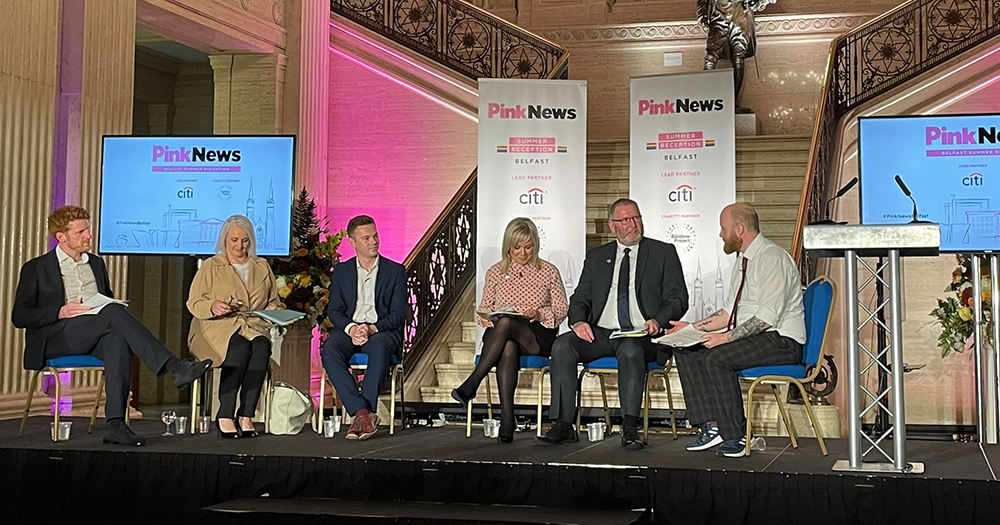Sinn Féin Stormont leader Michelle O’Neill has said that Northern Ireland has “come a long long way” with regards to LGBTQ+ issues, but that there is still “so much more to be done”. O’Neill was part of the PinkNews Summer Reception on Wednesday, July 6, alongside four other political party representatives, namely DUP MLA Pam Cameron, UUP leader Doug Beattie, Alliance MLA Eoin Tennyson and SDLP MLA Matthew O’Toole.
The panel discussion in Stormont’s Great Hall in Belfast was chaired by the director of the Rainbow Project, John O’Doherty, and offered speakers the opportunity to celebrate and reflect on recent developments regarding Northern Ireland’s LGBTQ+ community. It was also a chance to discuss what the future may hold for local queer folk.
Speaking at the event, O’Neill acknowledged the progress that had been made over recent years to advance a ban on conversion therapy, and to achieve marriage equality, despite challenges raised by the pandemic.
However, when it comes to access to healthcare, she was not so positive. The first minister-in-waiting called for greater workforce planning to attract specialist professionals, particularly in the area of Trans healthcare provision.
“Young Trans individuals medicating themselves… that’s just a desperate situation,” she said, also pointing to the high levels of suicide and self-harm rates among the community.
Her fellow politicians echoed this sentiment around the state of Trans healthcare, with Pam Cameron saying the current waitlist situation is “unacceptable”. She also claimed to have written to Health Minister Robin Swann about funding for an adult Trans clinic, saying that there is an increasing demand for services.
“Huge gaps of professionalism” across trans healthcare in NI, says @PamCameronDUP. Current waiting list is “unacceptable.” #PinkNewsBelfast
— PinkNews (@PinkNews) July 6, 2022
Matthew O’Toole added that Northern Ireland was starting from an “appallingly bad position” in terms of healthcare provision for Trans folk.
“Even talking about a Trans healthcare system is almost insulting to people who are right now in need and are facing extreme anxiety,” he said.
“We’ve seen a meaningful step forward in terms of rights for LGBTQ people in this place, but we shouldn’t kid ourselves that we’re at the cutting edge of rights, we’re not.”
Matthew O’Toole SDLP MLA for South Belfast speaking in Stormont at #PinkNewsBelfast ?️??️⚧️ pic.twitter.com/XKCuPLQEAr
— SDLP LGBT+ ?️??️⚧️? (@SDLPlgbt) July 7, 2022
Eóin Tennyson, who himself is a gay man, said that Trans people were “disproportionately” affected by the waiting list crisis. He also weighed in on the reformation of the Gender Recognition Act (GRA), saying: “This has been turned into a culture war issue and it’s absolutely ludicrous. Trans and non-binary people just want to be recognised as their authentic selves – that’s all they’re looking for.”
However, he was positive about other recent developments, and described the latest Stormont election as a “landmark” moment after three openly gay MLAs were elected to the Assembly, making “historic” progress for “LGBTQ+ visibility in politics”.
“I think given Northern Ireland’s past, given that homosexuality was only decriminalised 40 years ago, for us to have come along that journey and to have LGBTQ people elected to the highest offices in this land I think is a real landmark,” he commented.
There was cross-party support for LGBTQ+ inclusive education in schools, and many of the representatives expressed support for self-identification. During the discussion, Doug Beattie drew attention to the UUP’s work on queer issues including campaigning for gay men to be allowed to donate blood, as well as granting £250,000 in funding towards LGBTQ+ mental health services. He also noted that he led a motion on banning gay conversion therapy in Northern Ireland.
“It was a difficult debate that we had but it passed and that showed a real change in direction within this Assembly and this legislature, to be able to make those real changes and something we need to progress on in the future for all of our LGBT community,” Beattie said in reference to a conversion therapy ban.
“I’m hoping that in the months and years to come that we can actually progress that further to a degree of legislation so that we can actually ban this extremely harmful practice which is called conversion therapy.”
Overall, the individual parties expressed various commitments in terms of progressing LGBTQ+ rights in Northern Ireland, statements which are welcomed by the local queer community.
Surprisingly #PinkNewsBelfast reception in Stormont this evening wasn’t where all today’s drama was. Come long way as a rainbow community but important to focus on the ways to go on issues like trans healthcare and inclusive education. Thanks to @MatthewOToole2 for repping SDLP! pic.twitter.com/Lkr8EwgCRw
— Cllr. Séamas de Faoite (@SeamasBelfast) July 6, 2022
© 2022 GCN (Gay Community News). All rights reserved.
Support GCN
GCN is a free, vital resource for Ireland’s LGBTQ+ community since 1988.
GCN is a trading name of National LGBT Federation CLG, a registered charity - Charity Number: 20034580.
GCN relies on the generous support of the community and allies to sustain the crucial work that we do. Producing GCN is costly, and, in an industry which has been hugely impacted by rising costs, we need your support to help sustain and grow this vital resource.
Supporting GCN for as little as €1.99 per month will help us continue our work as Ireland’s free, independent LGBTQ+ media.

comments. Please sign in to comment.